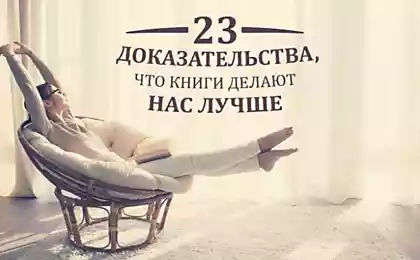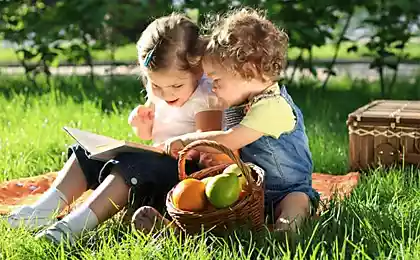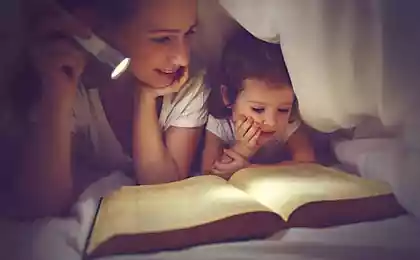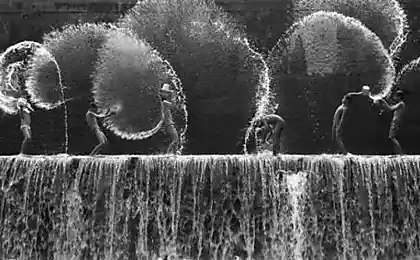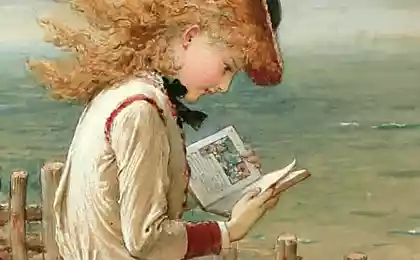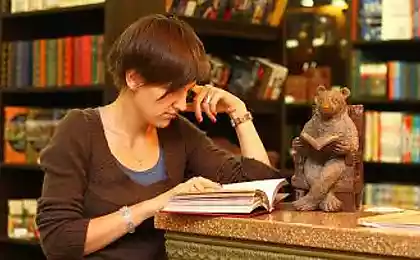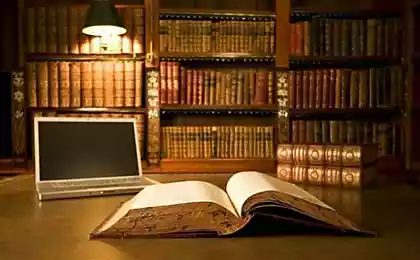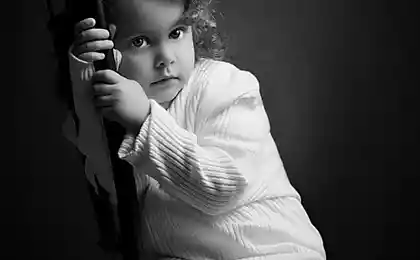241
The right books: what to read to children from 10 to 13 years
Our children have finally entered the age of adventure! Amazing, beautiful age when you can collect and glue ships, submarines, read Jules Verne, study the composition of gunpowder and make it, study the deductive method of Sherlock Holmes, discover mysterious islands with Stevenson. . .
Whether or not they do it depends on whether they read it or not. That is, whether they take a book in their hands in their free time, or they already have something to do, for example, play computer games.
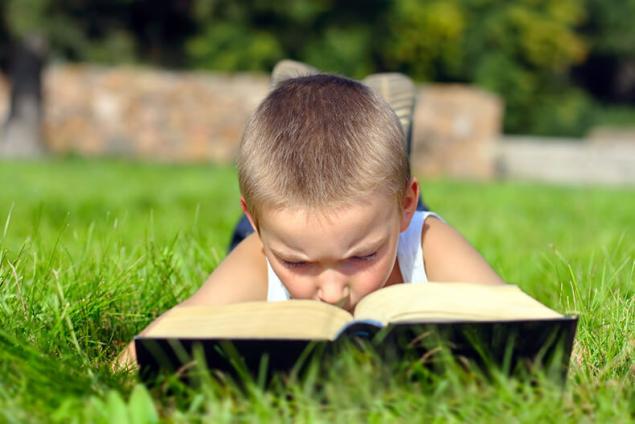
Since only 10% of children of this age want to read, we should briefly dwell on the “last parental attempt” to fall in love with a book. It may sound too dramatic, but until adolescence, until parental authority becomes a relic of the past, as long as any adult is trusted and obeyed, we can do it!
Only, dear adults, the age of adventure does not tolerate edification, especially in such delicate matters as reading or cleaning an apartment. Let's take the second out of the brackets and talk about the first.
Now, at age 10, our children can fall in love with reading forever, fall in love so much that you start to suffer when you don't read for long. To make that happen, first of all, let's look around and see which books are popular right now. For example, a few years ago, we could easily have read a few of the snippets that struck us in the Harry Potter book over dinner (although this is not the best example for many reasons, it has been written about many times already), and this would have been enough for the child to continue reading it himself. Now that the book is filmed, it is unlikely that those for whom it was written will want to read it.
Secondly, and this is much more important than the first, we should observe what the child is interested in, at least some predilection to see, to understand which of the literary heroes could call him, to love him really. I did so with Tonke Dracht’s Letter to the King, which captured the child’s attention from the first pages and became the first self-read book to hear the long-awaited request: “Give me another book like this.”
Here I had a little tight, because it was not the same, but in time arrived “Lord of the Rings” Tolkien. But most likely, this would hardly be possible if the theme of chivalry was not close to the child and initially did not cause interest and good emotions. Imagine if your son or your daughter looked like Atreus in Michael Ende’s Infinite History, and they care about saving the Land of Fantasy.
At this age, children are terrible fighters for justice, so both T. Dracht and M. Ende can help. And then don't stop, create. It is possible that acquaintance with Conan Doyle should start not with detective stories, but with the “Lost World”, which will become a pass to the Land of Reading. What is worth one story “When the earth cried out” or “Marakot’s abyss”? Try it, a little good parental advertising will not hurt. Do this not by praising the book, but by being proud that you know its secret.
To be honest, we’ve tried a lot of different ways to advertise. Best of all, of course, it takes place in a large children's group, but suddenly you have a free day in your class or on a family vacation, which you can give a book, as we once did.
It was summer in Crimea. In the camp, in a good children's camp, with good children and creative teachers, we organized Book Day. In the morning, at the traditional gathering, it was announced that today you can read. Not that before they were forbidden to read, but today it was “you can”, and everywhere: on the beach, on the way to the beach, in the dining room, during the quiet hour, on the balcony, in the garden, on the sports field – in general, always and everywhere.
In the evening I had to paint the cover of my favorite book. When they began to appear, we began to fill the huge wall in front of the dining room with them. Everyone could come up and put their name on the book they read. Advertising began to work on its own. Finally, we heard the children say, How? Haven't you read...? I'll tell you. The beauty of that day was, of course, that the children were of different ages, and the younger could “listen” to the older ones, and the older ones could rejoice in the books of childhood and put their names on them.
In the evening, we selected the 10 winning books with the most readers. The absolute winner then was the book by S. Lewis “The Chronicles of Narnia”, worthy of continuing a number of fascinating books for this age. For the sake of excitement, you can ask everyone how many pages he read in a day, and sum up the results by detachments and general camps.
Of course, we can come up with many more ways to engage a child with reading, the main thing is not to forget that the best advertising is enthusiastic parents and adults.
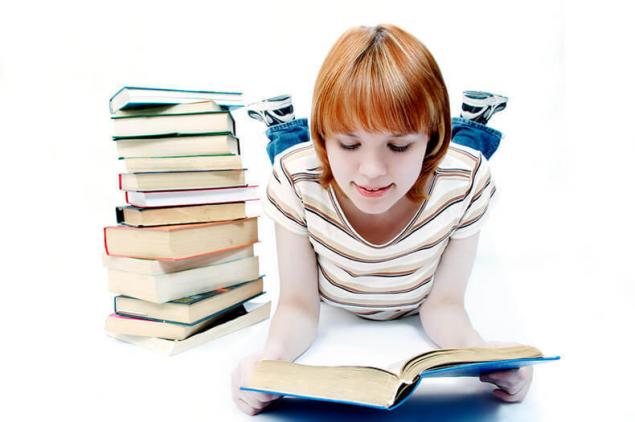
The ages of 10 to 13 are the age of authority, when children actively follow the example of the adults they respect, and so for the sake of them, children, we always give way to transportation; when we go with them, we cross the street only at the green light and open the book where there is an opportunity to read. Example works better than any words and edifications, children learn it as a way of life.
I want to believe that our efforts were not in vain, we succeeded, and the child “began to swallow books, drunk from the lines.” You think we can calm down now? Ironically, our parental role in reading is now reaching its climax. It is more important than ever that he reads. It would be fair to say: let him read everything, did we work so hard for so many years, giving him the right to read, to introduce censorship? He'll take the right to read everything, in two or three years, like any normal teenager, now we have the opportunity to give him a taste of good literature.
In addition, at the age of secondary school, the child continues to actively form ethical and moral criteria. And now he needs heroes who will become a reference point, create a value range. They will help me choose who I want to be and who I don’t, who I respect and who I despise. Something similar happens to what Vysotsky sang:
We play traitors, cowards, Jews.
In children's games, enemies were appointed.
And the wicked did not let the traces cool,
And the most beautiful women promised to love,
And, comforting friends and loving neighbors,
We put ourselves in the role of heroes.
And how interestingly in this ballad connected reflections on the struggle, feats with the conclusion:So you read the right books when you were a kid!?
What are they, the right books? Those who help him become human? Unfortunately, such a concept as a “real person” disappears from the consciousness of not only parents, but also teachers. It has become fashionable, which means it is important to make children successful in life so that everything is good for them, so that they do not strain, do not worry, do not defend.
At the same time, as soon as we face a more or less serious problem in life, we begin to suffer from indifferent doctors in clinics and hospitals, from “dangerous” realtors, from soulless officials, from tired teachers who spread their hands: “I don’t know what to do with your child.” Tomorrow they will be replaced by our children, who did not cry because of “White Beam, Black Ear”, who did not hate Romachine from “Two Captains”, who do not believe that you can pull yourself out of the swamp by the hair, as Baron Munghausen did, who do not know how to enjoy “crutches”, like Pollyanna.
It is necessary to have time to wake up their hearts, to convey values that are truly invaluable: honesty and honor, concern, generosity, sense of humor! “Then the surgeon will rush across the desert to a man with a broken knee.”
What You Should Not Always Ask Your Child
The problem of child biting
The child will come to us for another, more exciting book. And we will not get tired of stretching it and will not get tired of discussing with him the episodes we like and admiring the courage of the hero. Learning that he stopped at the turning point of the book, we offer to tell (and maybe write why not?) his sequel, to be a “competing writer”, and then compare with the author. Simultaneously with reading, we give children the right to create, conjecture, disagree, have their own opinions and “cultivate” their own moral criteria.
You never know whether in life will help the young person “Mystery of the Siberian Princess” T. Popova or “Little Princess” B. Francis, and another desperate tomboy “Ivango” V. Scott or “Birch Honey”... They will tell us this many years later when they grow up. published
Author: Tatiana Kurbatova
P.S. And remember, just by changing your consciousness – together we change the world!
Source: www.manwb.ru/articles/psychology/pedagogics/books-10-13/
Whether or not they do it depends on whether they read it or not. That is, whether they take a book in their hands in their free time, or they already have something to do, for example, play computer games.

Since only 10% of children of this age want to read, we should briefly dwell on the “last parental attempt” to fall in love with a book. It may sound too dramatic, but until adolescence, until parental authority becomes a relic of the past, as long as any adult is trusted and obeyed, we can do it!
Only, dear adults, the age of adventure does not tolerate edification, especially in such delicate matters as reading or cleaning an apartment. Let's take the second out of the brackets and talk about the first.
Now, at age 10, our children can fall in love with reading forever, fall in love so much that you start to suffer when you don't read for long. To make that happen, first of all, let's look around and see which books are popular right now. For example, a few years ago, we could easily have read a few of the snippets that struck us in the Harry Potter book over dinner (although this is not the best example for many reasons, it has been written about many times already), and this would have been enough for the child to continue reading it himself. Now that the book is filmed, it is unlikely that those for whom it was written will want to read it.
Secondly, and this is much more important than the first, we should observe what the child is interested in, at least some predilection to see, to understand which of the literary heroes could call him, to love him really. I did so with Tonke Dracht’s Letter to the King, which captured the child’s attention from the first pages and became the first self-read book to hear the long-awaited request: “Give me another book like this.”
Here I had a little tight, because it was not the same, but in time arrived “Lord of the Rings” Tolkien. But most likely, this would hardly be possible if the theme of chivalry was not close to the child and initially did not cause interest and good emotions. Imagine if your son or your daughter looked like Atreus in Michael Ende’s Infinite History, and they care about saving the Land of Fantasy.
At this age, children are terrible fighters for justice, so both T. Dracht and M. Ende can help. And then don't stop, create. It is possible that acquaintance with Conan Doyle should start not with detective stories, but with the “Lost World”, which will become a pass to the Land of Reading. What is worth one story “When the earth cried out” or “Marakot’s abyss”? Try it, a little good parental advertising will not hurt. Do this not by praising the book, but by being proud that you know its secret.
To be honest, we’ve tried a lot of different ways to advertise. Best of all, of course, it takes place in a large children's group, but suddenly you have a free day in your class or on a family vacation, which you can give a book, as we once did.
It was summer in Crimea. In the camp, in a good children's camp, with good children and creative teachers, we organized Book Day. In the morning, at the traditional gathering, it was announced that today you can read. Not that before they were forbidden to read, but today it was “you can”, and everywhere: on the beach, on the way to the beach, in the dining room, during the quiet hour, on the balcony, in the garden, on the sports field – in general, always and everywhere.
In the evening I had to paint the cover of my favorite book. When they began to appear, we began to fill the huge wall in front of the dining room with them. Everyone could come up and put their name on the book they read. Advertising began to work on its own. Finally, we heard the children say, How? Haven't you read...? I'll tell you. The beauty of that day was, of course, that the children were of different ages, and the younger could “listen” to the older ones, and the older ones could rejoice in the books of childhood and put their names on them.
In the evening, we selected the 10 winning books with the most readers. The absolute winner then was the book by S. Lewis “The Chronicles of Narnia”, worthy of continuing a number of fascinating books for this age. For the sake of excitement, you can ask everyone how many pages he read in a day, and sum up the results by detachments and general camps.
Of course, we can come up with many more ways to engage a child with reading, the main thing is not to forget that the best advertising is enthusiastic parents and adults.

The ages of 10 to 13 are the age of authority, when children actively follow the example of the adults they respect, and so for the sake of them, children, we always give way to transportation; when we go with them, we cross the street only at the green light and open the book where there is an opportunity to read. Example works better than any words and edifications, children learn it as a way of life.
I want to believe that our efforts were not in vain, we succeeded, and the child “began to swallow books, drunk from the lines.” You think we can calm down now? Ironically, our parental role in reading is now reaching its climax. It is more important than ever that he reads. It would be fair to say: let him read everything, did we work so hard for so many years, giving him the right to read, to introduce censorship? He'll take the right to read everything, in two or three years, like any normal teenager, now we have the opportunity to give him a taste of good literature.
In addition, at the age of secondary school, the child continues to actively form ethical and moral criteria. And now he needs heroes who will become a reference point, create a value range. They will help me choose who I want to be and who I don’t, who I respect and who I despise. Something similar happens to what Vysotsky sang:
We play traitors, cowards, Jews.
In children's games, enemies were appointed.
And the wicked did not let the traces cool,
And the most beautiful women promised to love,
And, comforting friends and loving neighbors,
We put ourselves in the role of heroes.
And how interestingly in this ballad connected reflections on the struggle, feats with the conclusion:So you read the right books when you were a kid!?
What are they, the right books? Those who help him become human? Unfortunately, such a concept as a “real person” disappears from the consciousness of not only parents, but also teachers. It has become fashionable, which means it is important to make children successful in life so that everything is good for them, so that they do not strain, do not worry, do not defend.
At the same time, as soon as we face a more or less serious problem in life, we begin to suffer from indifferent doctors in clinics and hospitals, from “dangerous” realtors, from soulless officials, from tired teachers who spread their hands: “I don’t know what to do with your child.” Tomorrow they will be replaced by our children, who did not cry because of “White Beam, Black Ear”, who did not hate Romachine from “Two Captains”, who do not believe that you can pull yourself out of the swamp by the hair, as Baron Munghausen did, who do not know how to enjoy “crutches”, like Pollyanna.
It is necessary to have time to wake up their hearts, to convey values that are truly invaluable: honesty and honor, concern, generosity, sense of humor! “Then the surgeon will rush across the desert to a man with a broken knee.”
What You Should Not Always Ask Your Child
The problem of child biting
The child will come to us for another, more exciting book. And we will not get tired of stretching it and will not get tired of discussing with him the episodes we like and admiring the courage of the hero. Learning that he stopped at the turning point of the book, we offer to tell (and maybe write why not?) his sequel, to be a “competing writer”, and then compare with the author. Simultaneously with reading, we give children the right to create, conjecture, disagree, have their own opinions and “cultivate” their own moral criteria.
You never know whether in life will help the young person “Mystery of the Siberian Princess” T. Popova or “Little Princess” B. Francis, and another desperate tomboy “Ivango” V. Scott or “Birch Honey”... They will tell us this many years later when they grow up. published
Author: Tatiana Kurbatova
P.S. And remember, just by changing your consciousness – together we change the world!
Source: www.manwb.ru/articles/psychology/pedagogics/books-10-13/
Black currant: how to deal with pests without Hijikata
"Xruschevka": 5 rules that will save any interior
